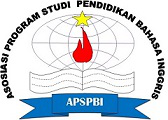HIGHER-ORDER THINKING SKILLS ON TEACHERS-MADE TESTS BY ENGLISH TEACHERS OF A SENIOR HIGH SCHOOL IN BENGKULU CITY
Abstract
Keywords
Full Text:
PDFReferences
Amaliyah, A. (2018). An analysis of multiple choice items made by teacher based on Bloom’s revised taxonomy theory at tenth grade of SMAN 1 Sidoarjo [An Undergraduate Thesis, Universitas Islam Negeri Sunan Ampel].
Anderson, L. W., & Krathwohl, D. R. (2001). A taxonomy for learning, teaching, and assessing: A revision of bloom’s taxonomy of educational objectives. New York: Allyn & Bacon.
Arikunto, S. (2005). Dasar-dasar evaluasi pendidikan. Jakarta: Bumi Aksara.
Conklin, W., & Manfro. (2012). Higher Order Thinking Skills to develop 21st century learners. Huntington: Shell Education Publishing, Inc.
Creswell, J. W., & Clark, P. V. L. (2007). Designing and conducting mixed methods research. Thousand Oaks CA: Sage Publications.
Febriyani, R. A., Yunita, W., & Damayanti, I. (2020). An Analysis on higher order thinking skill (HOTS) in compulsory English textbook for the twelfth grade of Indonesian Senior High Schools. Journal of English Education and Teaching, 4(2), 170-183. https://doi.org/10.33369/jeet.4.2.170-183.
Gareis, C. R., & Grant, L. W. (2015). Teacher-made assessments: How to connect curriculum, instruction, and student learning. (2nd edition). Oxford, United Kingdom: Routledge.
Hajaroh, S., & Adawiyah R. (2018). Kesulitan guru dalam mengimplementasikan penilaian autentik. Midad Jurnal Jurusan PGMI, Vol 10 No 2. 131-152.
Huda, M., Purnomo, E., Anggraini, D., & Prameswari, D. H. (2021). Higher order thinking skills (HOTS) dalam materi dan soal pada buku pelajaran Bahasa Indonesia SMA terbitan Kemendikbud RI. Prasi: Jurnal Bahasa, Seni, dan Pengajarannya, Vol 16 No 2, 128-143. http://dx.doi.org/10.23887/prasi.v16i02.40671.
‘Ilma, F. (2018). Higher order thinking skill questions in reading exercises: An analysis of reading exercises in Bright course book for seventh grade of Junior High School students 2013 curriculum published by Erlangga in the year of 2016 [An Undergraduate Thesis, Universitas Islam Negeri Walisongo].
Jailani, & Retnawati, H. (2016). The challenges of junior high school mathematic teachers in implementing the problem-based learning for improving the higher-order thinking skills. The Online Journal of Counseling and Education, Vol 5 No 3, 1–13.
Jasrial, D., Yunita, W., Sukma, B., & Septianggaira, A. (2021). Appreciating students’ responses: Verbal and non-verbal compliments used by English teachers in classroom. Pedagogy: Journal of English Language Teaching, Vol 9, No 2. 165-176. https://10.32332/joelt.v9i2.3650.
Kusuma, M. D., Rosidin, U., Abdurrahman, A., & Suyatna, A. (2017). The Development of Higher Order Thinking Skill (Hots) Instrument Assessment In Physics Study. IOSR Journal of Research & Method in Education (IOSRJRME), Vol 07 No 01, 26– 32. https://doi.org/10.9790/7388-0701052632
Liu, X. (2009). Essentials of science classroom assessment. Thousand Oaks, California: Sage Publications.
Magno, C. (2003). The profile of teacher-made test construction of the professors of University of Perpetual Help Laguna. UPHL Institutional Journal, Vol 1 No 1, 48-55.
Martinez, M. E. (1999). Cognition and the questions item format. Educational Psychologist, Vol 34 No 4, 207-218. https://doi.org/10.1207/s15326985ep3404_2
Pratiwi, N. P. W., Dewi, N. L. P. E. S., & Paramartha, A. A. G. (2019). The reflection of HOTS in EFL teachers’ summative assessment. Journal of Educational Research and Evaluation, Vol 3 No 3, 127-133.
Putri, A. H, (2020). An analysis of higher order thinking skill (HOTS) and lower order thinking skill (LOTS) in test constructed by twelfth grade English teacher at SMAN 6 Kota Bengkulu [An unpublished thesis, Universitas Bengkulu].
Rakib, M., Rombe, A., & Yunus, M. (2016). Pengaruh Pelatihan Dan Pengalaman Mengajar Terhadap Profesionalitas Guru. Jurnal Ad’ministrare, Vol 3 No 2, 137–148.
Retnawati, H., Djidu, H., Kartianom, Apino, e., Risqa D, & Anazifa. (2018). Teachers’ knowledge about Higher-Order Thinking Skills and its learning strategy. Problems of Education in The 21st Century, Vol 76 No 2,215-230.
Retnawati, H., Hadi, S., & Nugraha, A. C. (2016). Vocational high school teachers’ difficulties in implementing the assessment in curriculum 2013 in Yogyakarta Province of Indonesia. International Journal of Instruction, Vo 9 No 1, 33–48. doi:10.12973/iji.2016.914a.
Ramadhanti, N. (2019). Pengaruh pengalaman mengajar dan banyaknya pelatihan yang pernah diikuti terhadap kinerja guru SD Sekbin 1 Kecamatan Ketanggungan Kabupaten Brebes [A bachelor thesis, Universitas Negeri Semarang]. 1401415197__Optimized.pdf (unnes.ac.id)
Riduwan. (2013). Dasar-dasar statistik. Alfabeta.
Riadi, B., & Hilal, I. (2017). Instrumen penilaian buatan guru Bahasa Indonesia SMP di Kota Bandar Lampung. AKSARA Jurnal Bahasa dan Sastra, Vol 18 No 2,145-153.
Sulaiman, T., Muniyan, V., Madhvan, D., Hasan, R., & Rahim, S. (2017). Implementation of higher order thinking skills in teaching of science: A case study in Malaysia. International Research Journal of Education and Sciences, Vol 1 No 1, 1-3.
Sándorová, Z. (2014). Content analysis as a research method in investigating the cultural components in foreign language textbooks. Journal of Language and Cultural Education, Vol 2 No 1, 95-198.
Septiarini, A., & Puspasari, D. (2020). Pengembangan LKPD berbasis HOTS dan inkuiri terbimbing pada Mata Pelajaran Otomatisasi Tata Kelola Humas dan Keprotokolan kelas XII OTKP Semester Gasaldi SMKN10 Surabaya. Jurnal Pendidikan Administrasi Perkantoran,Vol 8 No 1, 9-21.
Serevina, V., Sari Y. P., & Maynastiti, D. (2019). Developing high order thinking skills (HOTS) assessment instrument for fluid static at senior high school. IOP Conf. Series: Journal of Physics: Conference Series, Vol 1185 No 2019, 1-9. http://dx.doi.org/doi:10.1088/1742-6596/1185/1/012034.
Sugiyono. (2013). Metode penelitian kuantitatif, kualittative, dan R & D. Bandung: Alfabeta.
Syahdanis, J. D., Sofyan, D., Yunita, W. (2021). Analysis of HOTS in English teacher made test. Jurnal Basis: Jurnal Bahasa dan Sastra Inggris Universitas Putera Batam, Vol 8 No 2, 125-138. https://doi.org/10.33884/basisupb.v8i2.4479.
Utami, F. D. ,Nurkamto, J., & Marmanto, S. (2019). Higher Order Thinking Skills on Test Items Designed by English Teacher. International Journal of Educational Research Review, Vol 4, 756-765. http://dx.doi.org/10.24331/ijere.629581.
Wahyuni, A. R., Tamrin, A. G., & Nurhidayati, A. Implementasi higher order thinking skills soal ujian dasar-dasar konstruksi bangunan dan teknik pengukuran tanah. Indonesian Journal of Civil Engineering Education, Vol 5 No 2, 9-14. https://dx.doi.org/10.20961/ijcee.v5i2.43480.
Warmadewi, P. S., Agustini, D., & Wedhanti, N. (2019). Analysis of learning higher order thinking skill (HOTS) toward English subject. Jurnal Penelitian dan Pengembangan Sains dan Humaniora, Vol 3 No 2, 134-140. http://dx.doi.org/10.23887/jppsh.v3i2.21278.
Yunita, W., Syahrial., & Hati, G. M. (2020). English teachers’ knowledge on higher order thinking skills (HOTS). English Review: Journal of English Education, Vol 9 No 1, 205-216. https://doi.org/10.25134/erjee.v9i1.3800.
DOI: http://dx.doi.org/10.20527/jetall.v5i2.13462
Article Metrics
Abstract view : 541 timesPDF - 289 times
Refbacks
- There are currently no refbacks.
This journal is indexed in:


This Journal is listed in:
 Journal of English Teaching, Applied Linguistics and Literatures (JETALL)
Journal of English Teaching, Applied Linguistics and Literatures (JETALL)









.png)



1.png)
